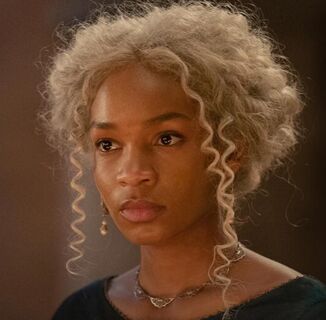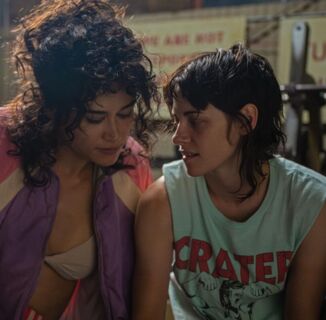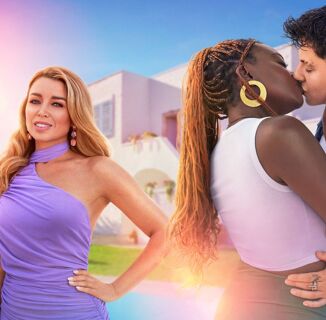It can be hard to use language to pinpoint something as particular and personal as gender or sexuality. But there’s a resource for those who are trying to find a word that best describes them.
Queer Undefined is a crowd-sourced LGBTQ+ dictionary that harnesses the power of queers on the internet and wears its sources on its sleeve. The site relies on community input to define its terms; contributors share personal stories that illustrate how they might have come to that identity. INTO spoke to the site’s founder and creator Sara Goldstein-Weiss about her inspiration for the site and what it’s like to help queers define themselves.
When inspired you to make this kind of resource for LGBTQ+ people?
I started making it in August of 2017 and it launched in April 2018. It started off really as a side project that I didn’t know if I would ever finish. But what inspired me was having all these questions from Tumblr followers asking me what terms they were allowed to use or how they should define themselves. I was feeling like I wasn’t authorized to answer those questions and that a resource like this would be more useful. I saw in my research that this didn’t exist yet, so I created it.
You say that your own experiences on the internet prompted you to create this resource. Can you talk about what the internet means for you as a queer individual?
The internet has been really important to me as a queer person. Especially, I think, in middle and high school, I started questioning my sexuality at a really young age, but it wasn’t until middle school that I started exploring things on the internet that I was too afraid to ask in person or put into words. Particularly with Tumblr, seeing people live their queerness in a different way online, or in a way I hadn’t experienced as a closeted teenager, that was really pivotal to accept things that I had been in denial of for a really long time.
I think one great thing about the internet is that it particularly gives a space for young queer people to be in conversation with one another and provide support for one another in a relaxed setting.
The internet is such a crucial place for queer people and we see more and more platforms kind of turning on their LGBTQ users, like Facebook, Twitter and YouTube. Where does Queer Undefined fit in this changing internet landscape?
I do think that, even though these sites can be used by queer people to create community, they also can’t be trusted. Tumblr, even though it’s seen as a queer people’s social network, it also flagged “lesbian” as an unsafe search term. With Queer Undefined, I tried to make this really mindfully to serve the queer community. That’s all it’s for! If it’s not doing that, it’ll need to change. That changes it from Urban Dictionary, where you can look up these terms, but they might not be curated in a way that’s actively trying to make a safe space for everyone in the LGBTQ+ community.
There’s a feedback mechanism that’s inherent to what Queer Undefined is — people can dispute definitions and give feedback. What made you want to turn the glossary into a conversation?
I think that’s really important to me, because going into the site, one of my main questions was like, “Who am I to define all these things?” I didn’t know what I wanted it to look like going in, but I didn’t want to put myself in a position of authority on these things when I didn’t identify as them. So I wanted to put that in as a way to have all voices be heard and not have one decisive voice.
One of the interesting things about your glossary is that it’s informed by community input, and a lot of people have this idea that the dictionary is some kind of authority on words, as if the definition comes from some God-like figure from above. Why was it so essential that Queer Unrefined be informed by the community?
Yeah, that’s right. That’s what I was trying to play with with the name, Queer Undefined. I’m trying not to box in those terms. I want people to pull them apart and put them back together and make sense of them.
Obviously, terms that queer people use are always evolving — in wanting to be a “queer dictionary” of sorts, how do you make sure you’re up to date with the changing queer vernacular?
One thing is that, sometimes terms that have been talked about in the past come to seem more harmful or limiting, so I have an option for people to report any definition they see as hurtful or disrespectful.
In terms of new terms, people can define any word that they think should be in the dictionary or if they know a term that they think should be in a dictionary and they don’t see it yet.
You say Queer Undefined will go beyond definitions into the stories of words and terms — can you talk a little bit about that?
So, I happen to be on the page for “bisexual” right now. And there’s one definition by someone named “XX” who says “I liked boys openly for 15 years and then I met a girl …” but I think that kind of personal explanation of that person’s journey for identifying that way can be really useful for people who are questioning their identities who are coming to this page.
I think going into the more subjective parts of the meaning of these words goes against the traditional idea of a dictionary, where it’s supposed to be some kind of objective truth. It shows how people are living these words and may not have a necessarily strict meaning.
When you created this resource, did you have like an ideal reader in mind? Do you think it’s for everybody, or a certain kind of queer person?
I kind of had two or three ideal readers in mind. The first one or two being someone who is looking for a label or trying to understand their identity or wondering what words they’re allowed to use to describe themselves. And I’m getting these ideas from people who would come to me and ask me questions about words? Like, “Can I call myself gay?” And that’s an ideal reader, is someone who is questioning.
Another ideal reader is an ally who wants to learn more.
As someone who is curating this project, what’s a word you learned about through Queer Undefined that you maybe didn’t know as much about before?
There’s definitely a lot of them! One is abrogender, I had never heard that term before. That’s a layered gender. I learned a lot of gender identity terms, because I haven’t done a lot of questioning in that area, so I knew less about that than sexual terms. There’s another one called alterous attraction.
In your manifesto for the site, you mention that queerness resists categorization and easy definition, which makes new terms and new, hyper-specific language necessary to capture the queer experience. What excites you about the creation of new terms?
I think one thing that really excites me is seeing terms that I didn’t know before that relate to my experience or my friends’ experiences. I had a friend who came to me a month or two before I started doubling down on this project and she and I were talking about her feeling of not being sure if she was experiencing gender dysphoria, because she was uncomfortable being the “group mom” or other gendered terms, but she was having trouble taking ownership of the term “gender dysphoria.”
I read the term social dysphoria and told her and she was like, “This is what I’m going through!” and seeing someone else define the word for her made it feel real. I could tell she was really grateful and I feel like reading that definition, and knowing someone else had experienced that and put it into words made her feel accepting of that experience and validated her feelings in a different way.
Help make sure LGBTQ+ stories are being told...
We can't rely on mainstream media to tell our stories. That's why we don't lock our articles behind a paywall. Will you support our mission with a contribution today?
Cancel anytime · Proudly LGBTQ+ owned and operated
Read More in Impact
The Latest on INTO
Subscribe to get a twice-weekly dose of queer news, updates, and insights from the INTO team.
in Your Inbox












